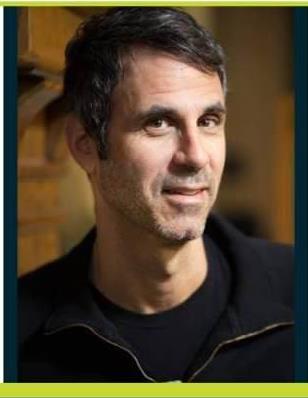
~From English Department Communications Intern Kaitlyn Phillips
At 7:30 in the Lory Student Center’s Cherokee Park Ballroom, people began to filter in and take their seats. They talk excitedly, browse the books for sale in the corner, and await author Steve Almond to take the stage and recite a sample of his work.
Having never read Almond’s work before this event, I didn’t know what to expect; the people around me ranged from elderly gentleman in suits with pristine copies of Almond’s work in hand, to undergraduate English majors like myself, dressed in jeans and flannels and gathering to laugh and talk loudly in the room’s corners. There was, however, a conspicuous lack of younger children in the room, and I soon found out why.
After several introductions from faculty and grad students alike, Steve Almond took to the podium followed by an almost rowdy round of applause from the audience.
What followed was an hour of the audience laughing almost nonstop.
Almond’s work, to my surprise, was mostly satirical, blending crude humor and serious debate in an absolutely unique and hysterical way that kept the viewers present (myself included) close to tears with laughter throughout the reading.
As Almond read his work, I began to realize that the lack of children was for good reason; Almond’s work, while hilarious, is definitely not meant for a younger audience.
He began with several excerpts from his book Against Football, a brilliant critique of the dark side of America’s favorite game that reveals its tendencies to promote violence, over indulgence, homophobia, and racism. Though the topic of the piece is in-depth and often times heavy, Almond is able to highlight these ideas more effectively through humor, both provoking the audience to thought and leaving them laughing.
He continued by introducing books he had written and published himself, short and contained novellas or essays whose contents range from hate mail he receives and his (hysterical) responses to them, to a collection of “short shorts” that he describes as “little bursts of empathy.” These small samples of Almond’s work can only be purchased in cash and from him directly; this project was set up this way intentionally; as Almond explained, “everybody who owns one of these books has taken it from my hands; an interaction had to have occurred for them to read it.”
One of the most memorable moments of the reading for me came from an excerpt from one of these small novels called “Bad Poetry,” in which Almond showcases the few years he “decided [he] could write poetry,” as he puts it. He read, reciting his own evaluation, “the worst poem ever written” entitled “Hobo Chant, 1938.” Almond’s reading and response was (of course) hysterical, but he ended his response to the poem with a lesson he took away from writing it, saying “Anytime you fail at a piece of writing, it is only because it was a story you were not ready to tell.”
It’s safe to say the rest of the audience enjoyed the reading at least as much as I did; there were lines out the door to purchase Almond’s work, and many waited for nearly an hour after the event’s end to purchase the smaller collection he carries with him.
As someone who is normally wary of satirical essays and notoriously hard to impress with crude humor, I couldn’t recommend Steve Almond’s work more; as a balanced collection of humor, satire, and thought-provoking reality, Almond’s novels, essays, and short stories are definitely worth a read.
Much of Almond’s work is available in CSU’s bookstore, including Against Football and his newest release, a collection of short stories titled God Bless America. All of his work, with the exception of the short novels described here, can be purchased on http://againstfootball.org/
The Creative Writing Reading Series at CSU is organized by English Department faculty and the Organization of Graduate Student Writers (OGSW); Creative Writing faculty serve on a rotating basis as director of the series and faculty advisor to OGSW. The series has a small annual budget and relies on the support of the Associated Students of Colorado State University (ASCSU), the College of Liberal Arts dean’s office, donors, local businesses, and CSU’s English Department. Its spring 2016 events are made possible with support from CSU’s Lilla B. Morgan Memorial Endowment, a premier funder of the arts at CSU. Please help grow this fund with a gift at: http://president.colostate.edu/lillabmorgan/index.aspx. All events are free and open to the public.
Next reading: MFA Thesis Reading (Nonfiction), Thursday March 24. 7:30 pm – 9:00 pm in the Clara Hatton Gallery, Visual Arts Building.